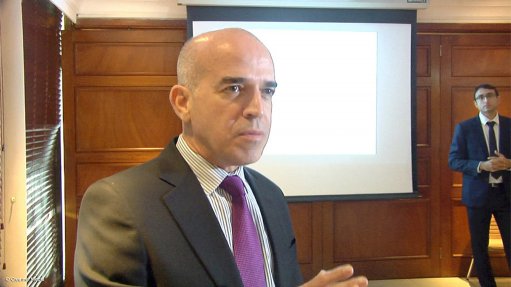
Industrial Development Corporation (IDC) research and information head Jorge Maia
Photo by: Creamer Media
JOHANNESBURG (miningweekly.com) – South Africa needs to aim towards smarter mining, smarter agriculture and smarter manufacturing.
“It’s about taking all the major sectors of the economy forward, with each feeding on the other,” says Industrial Development Corporation (IDC) research and information head Jorge Maia of the roles that must be played by agriculture, mining and manufacturing. (Also watch attached Creamer Media video).
In the case of mining, he sees the need to attract foreign direct investment and add value to primary resources wherever it is economically feasible to do so.
Both he and United Nations Conference on Trade and Development (Unctad) economic affairs officer Stefan Csordas responded to questions put by Mining Weekly Online at the release of the third Unctad report in a series of biennial reports on themes and issues relevant to commodity dependent countries.
Csordas, a former United Nations Economic Commissioner for Africa based in Addis Ababa, emphasised the need for commodity dependent countries like South Africa to create inclusive growth, as commodity growth alone was insufficient to close the inequality gap.
Required they say are approaches to primary resource development that promote inclusive growth and Unctad forewarns that many commodity-dependent developing countries are in danger of falling short of achieving their sustainable development goals (SDGs) by 2030.
A key South African priority in Csordas’ view is that commodity benefits be made to extend to the poorer segments of society to ensure that SDGs are achieved in the next 12 years.
“It’s not just about extracting and exporting because if you do that you’re really perpetuating the dependency and vulnerability,” Maia warns.
Needed is the establishment of rewarding linkages between mining and services, mining and manufacturing, mining and agriculture.
Such linkages are seen to be essential for sustainability and mutually beneficial outcomes.
“It’s really about making the right moves, which have to be made with a very strong degree of realism,” Maia adds.
On the agricultural front, he pinpoints the absence of land ownership and tenure across a major segment of the population as the key retardant of inclusive growth.
“When it comes to those still aspiring to join the formal agricultural economy, there’s much we can do as a country to assist that process,” he says.
Meanwhile, in the established agricultural sector, he sees considerable room for the diversification of production and points out how successfully the IDC has led the way in diversification, which has played an important counter cyclical role.
On the value addition and manufacturing fronts, there are indications of opportunities opening up for South Africa to regain lost ground, particularly along the chrome value chain where China appears to be losing the competitive edge.
Csordas emphasises the importance of investment in education and the expansion of skill sets to allow people to access higher paid jobs and for local businesses to be able to achieve competitive levels of productivity.
The Commodities and Development Report 2017, produced by Unctad in conjunction with the Food and Agriculture Organisation of the United Nations, focuses on the various linkages between the international commodity markets and economic growth and how development can lower the risk of economic volatility.
It is shown to be absolutely essential for commodity countries to have resilient economies, which means saving during commodity price windfalls and using that money to maintain development programmes throughout the periods of low commodity jolts.
It is also seen as essential that economies diversify horizontally and vertically, add value domestically and expand the linkages between the commodity sector and the national economy to provide the funds required for social protection, health and education.